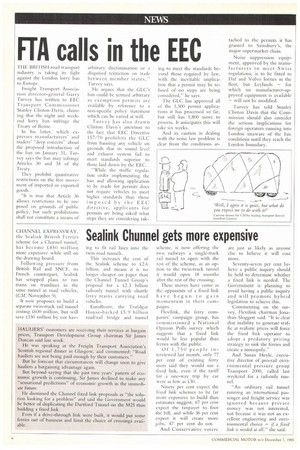Sealink Chunnel gets more expensive
Page 8

If you've noticed an error in this article please click here to report it so we can fix it.
CHANNEL EXPRESSWAY, the Sealink British Ferries scheme for a Channel tunnel, has become £450 million more expensive while still on the drawing board.
Following pressure from British Rail and SNCE, its French counterpart, Sealink has scrapped plans to run trains on tramlines in the same tunnel as road vehicles, (CM, November 9).
It now proposes to build a separate twin-track rail tunnel costing i:600 million, but will save f.150 million by not hay ing to tit rail lines into the twin road tunnels.
This increases the cost of the Sealink scheme to £2.6 billion, and means it is no longer cheaper on paper than the Channel Tunnel Group's proposal for a £2.3 billion rail-only tunnel with shuttle ferry trains carrying road vehicles.
EuroRoute, the Trafalgar House-backed 2.5.9 billion road/rail bridge and tunnel scheme, is now offering the two railways a single-track rail tunnel to open with the rest of the scheme, as an option to the twin-track tunnel it would open 18 months after the rest of the crossing.
These moves have come as the opponents of a fixed link have begun to gain momentum in their campaigns.
Flexilink, the ferry companies' campaign group, has commissioned a National. Opinion Polls survey which suggests that a fixed link would be less popular than ferries with the public.
Of 1,750 people interviewed last month, only 77 per cent of existing ferry users said they would use a fixed link, even if the tariff for a one-way trip by car were as low as £30.
Ninety per cent expect the fixed link schemes to be far more expensive to build than estimates suggest, 67 per cent expect the taxpayer to foot the bill, and while 36 per cent expect it will create more jobs, 47 per cent do not.
And Conservative voters
arc just as likely as anyone else to believe it will cost more.
Seventy-seven per cent believe a public inquiry should be held to determine whether a fixed link is needed. The Government is planning to avoid having a public inquiry and will promote hybrid legislation to achieve this.
Commenting on the survey, Flexilink chairman Jonathan Sloggett said: "It is clear that inability to generate traffic at realistic prices will force the fixed link operator to adopt a predatory pricing strategy to sink the ferries and create a monopoly."
And Susan Hoyle, executive director of pro-rail environmental pressure group Transport 2000, called last weekend for a rail-only tunnel.
"An ordinary rail tunnel running an international passenger and freight service was ignored because private money was not interested, not because it was not an excellent engineering and environmental choice — if a fixed link is needed at all:" she said.




































































































